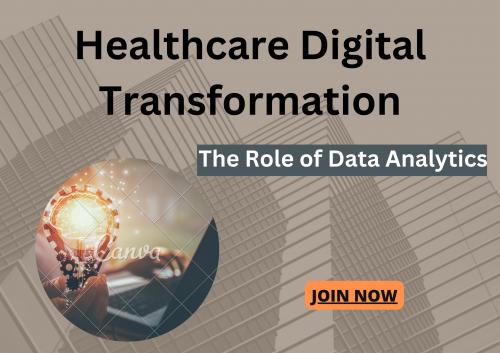The Role of Data Analytics in Healthcare Digital Transformation

The Role of Data Analytics in Healthcare Digital Transformation
Digital transformation in healthcare
Digital transformation in healthcare refers to the process of using technology to improve the quality of healthcare services, increase efficiency, and reduce costs. It involves the integration of digital technologies, such as electronic health records, telemedicine, wearables, and other tools, into healthcare systems.
Some examples of digital transformation in healthcare include:
Electronic Health Records (EHRs): The use of EHRs allows healthcare providers to access patient information, medical history, and test results quickly and easily. This helps to improve patient care and reduce medical errors.
Telemedicine: Telemedicine allows patients to receive medical care remotely, which can be especially beneficial for those who live in rural areas or have mobility issues. Telemedicine can also help reduce healthcare costs by reducing the need for in-person appointments.
Wearable Technology: Wearable technology, such as fitness trackers and smartwatches, can monitor a patient's health data and provide real-time feedback. This can help patients manage chronic conditions and improve their overall health.
Big Data Analytics: Healthcare providers can use big data analytics to identify trends, track patient outcomes, and improve population health. This can lead to more targeted and effective treatments.
Areas of health undergoing digital transformation
Digital transformation is touching almost every area of healthcare. Here are some of the key areas that are undergoing significant transformation due to the adoption of digital technologies:
Artificial Intelligence (AI) and Machine Learning (ML): AI and ML are being used to analyze vast amounts of healthcare data to identify patterns and trends, and to develop more personalized treatments. This leads to more targeted and effective treatments.
Blockchain: Blockchain technology is being used to create secure, tamper-proof electronic health records, improving the security and privacy of patient data.
Population Health Management: Digital tools are being used to analyze population health data, enabling healthcare providers to identify health trends and develop interventions to improve health outcomes on a larger scale.
Patient Engagement: Digital technologies are enabling patients to be more engaged in their own care, through tools such as patient portals, mobile apps, and telehealth visits.
Post Your Ad Here
Comments